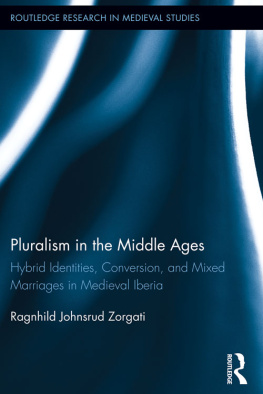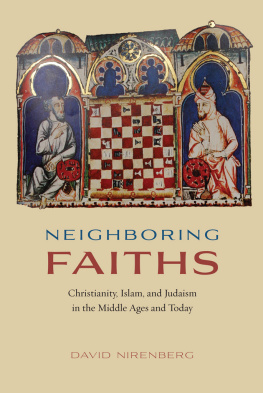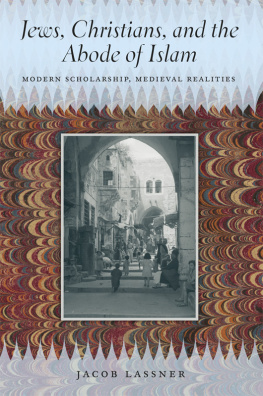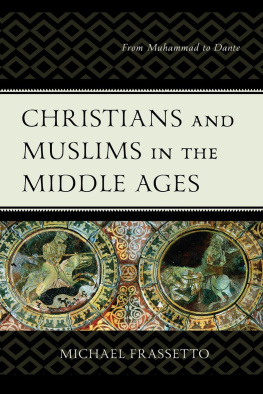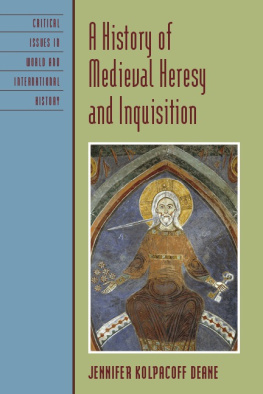Jews, Christians, and Muslims in the Middle Ages were divided in many ways. But one thing they shared in common was the fear that God was offended by wrong belief. Medieval Heresies: Christianity, Judaism, and Islam is the first comparative survey of heresy and its response throughout the medieval world. Spanning England to Persia, it examines heresy, error, and religious dissent and efforts to end them through correction, persuasion, or punishment among Latin Christians, Greek Christians, Jews, and Muslims. With a lively narrative that begins in the late fourth century and ends in the early sixteenth century, Medieval Heresies is an unprecedented history of how the three great monotheistic religions of the Middle Ages resembled, differed from, and even interrelated with each other in defining heresy and orthodoxy.
Christine Caldwell Ames is Associate Professor of History at the University of South Carolina. She is the author of Righteous Persecution: Inquisition, Dominicans, and Christianity in the Middle Ages .
This is a series of introductions to important topics in medieval history aimed primarily at advanced students and faculty, and is designed to complement the monograph series Cambridge Studies in Medieval Life and Thought . It includes both chronological and thematic approaches and addresses both British and European topics.

University Printing House, Cambridge CB2 8BS, United Kingdom
Cambridge University Press is part of the University of Cambridge.
It furthers the Universitys mission by disseminating knowledge in the pursuit of education, learning and research at the highest international levels of excellence.
www.cambridge.org
Information on this title: www.cambridge.org/9781107023369
Christine Caldwell Ames 2015
This publication is in copyright. Subject to statutory exception and to the provisions of relevant collective licensing agreements, no reproduction of any part may take place without the written permission of Cambridge University Press.
First published 2015
Printed in the United Kingdom by Clays, St Ives plc
A catalogue record for this publication is available from the British Library
Library of Congress Cataloguing in Publication data
Ames, Christine Caldwell.
Medieval heresies : Christianity, Judaism, and Islam / Christine Caldwell Ames.
pages cm. (Cambridge medieval textbooks)
ISBN 978-1-107-02336-9 (hardback)
1. Christian heresies History Middle Ages, 600-1500.
2. Jewish heresies History To 1500. 3. Islamic
heresies History To 1500. 4. Christianity and other religions. I. Title.
BT1319.A46 2015
206.5dc23
2014042933
ISBN 978-1-107-02336-9 Hardback
ISBN 978-1-107-60701-9 Paperback
Additional resources for this publication at www.cambridge.org/medievalheresies
Cambridge University Press has no responsibility for the persistence or accuracy of URLs for external or third-party internet websites referred to in this publication, and does not guarantee that any content on such websites is, or will remain, accurate or appropriate.
To my children
Contents
Figures
Maps
Acknowledgments
While I am no Augustine, the Quodvultdeus of this project was Elizabeth Friend-Smith at Cambridge University Press. A comparative history of heresy in medieval Judaism, Christianity, and Islam was Lizs inspired idea, and I can only hope that this book reflects a bit of what she first envisioned. I am enormously grateful to Liz for her insights and patience throughout the process, to Valerie Appleby for shaping this into a book students might read, and to Rosalyn Scott for her cheerful assistance in all things.
Colleagues and friends answered questions, read drafts, or otherwise spurred me to think hard about heresy: Sean Anthony, Peter Biller, Paul Cobb, Jeremy Cohen, Andy Kelly, Cornelia Linde, Bob Moore, Ed Peters, Damian Smith, Sita Steckel, and David Zbiral. I benefited enormously, as ever, from the bracing tonic of conversations with Mark Gregory Pegg. Its a particular pleasure to acknowledge the generous help of my new departmental colleagues Andrew Berns and Matthew Melvin-Koushki. Thanks to the anonymous readers at Cambridge University Press. Several of my students read chapter drafts, and Im grateful to Heath J. Ellison, Carl M. Garris, Randy M. Joye, Chase Owens, Savannah Salter, Matthew Thomas, and Steven Zimovan for their keen undergraduate eyes. It goes without saying that all errors remain my sole property.
The University of South Carolina granted me a sabbatical to write this book, and I thank the then-chair of the History department, Lawrence Glickman; Dean of Arts and Sciences Mary Anne Fitzpatrick; and Provost Michael Amiridis for their support. I abashedly apologize to the staffs at the Circulation and Interlibrary Loan departments at Thomas Cooper Library, where I was surely the most wayward, and least popular, client.
I first studied medieval Judaism, Christianity, and Islam comparatively under the guidance of Olivia Remie Constable and Michael Signer, and both were often before me as I wrote.
My sister-in-law Marjon Ames shared chapter deadlines, shared missing them, and shared the consequent beverage penalties. Lauren Sklaroff Lamey was my model for a scholar, a teacher, an administrator, and a mother. Laura Braunstein and Carina Huynh Benningfield brought me back to reality. My husband, Alexander Vaughan Ames, lovingly supplied Middle English definitions. Caitlin Conway, Alicieont Smith, and especially Melissa Sikora affectionately tended my children when I could not.
This book is dedicated to my children: May your liberty of mind and body never be at the mercy of others notions of paradise, and of their certain faith in how to attain it.
Note on texts and translations
While it hopes to contribute to scholarly conversations about heresy in the Middle Ages, Medieval Heresies has been written with an eye to student use. Wherever possible, I have used primary sources readily available in English translation, including some that exist online. On rare occasions, I have provided my own translations from the original language, and these are identified in the notes. Footnotes have been kept to a minimum, and normally accompany only direct quotation from primary sources. I encourage readers to consult not only the For further reading section at the end of the book, but also the fuller, traditional bibliography available on the books website.
Perhaps fittingly, this book is unorthodox in its use of diacritical marks for transliterated words. For readability, I follow the model of Fred M. Donner, Muhammed and the Believers: At the Origins of Islam (Cambridge, Mass.: Belknap Press of Harvard University Press, 2010) in including only those for ayn () and hamza ().
References to the Hebrew Bible and to the New Testament are from M. D. Coogan, M. Z. Brettler, C. A. Newsom, and P. Perkins (eds.), The New Oxford Annotated Bible , New Revised Standard Version, third edn. (Oxford University Press, 2007). References to the Quran are from The Quran , trans. M. A. S. Abdel Haleem (Oxford University Press, 2008).


